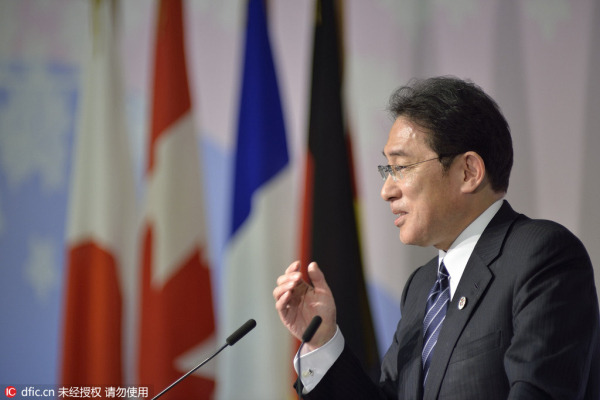Kishida's talks should eye crisis prevention
Updated: 2016-04-28 07:12
(China Daily)
|
|||||||||
 |
|
Japanese Foreign Minister Fumio Kishida gestures during a press conference at the International Media Center in Hiroshima, Japan on April 11, 2016 after Foreign Ministers meeting of G7 countries visit the Peace Memorial Museum. [Photo/IC] |
As announced by Chinese Foreign Ministry spokeswoman Hua Chunying on Wednesday, Japanese Foreign Minister Fumio Kishida will finally make a three-day visit to Beijing tomorrow, a visit he and his government have eagerly anticipated.
This is understandable considering the strained bilateral ties and, more recently, the Tokyo-orchestrated G7 declaration on the East and South China seas.
Tokyo has appeared anxious for high-level exchanges, but it has a lot to clarify and explain to Beijing.
From Beijing's standpoint at least, Tokyo had eaten too many of its words previously. So many so that it hardly matters what it has to say this time.
The Shinzo Abe administration has a serious credibility problem in handling relations with neighboring countries, China in particular, so Beijing's frustration and disappointment is justifiable as well as understandable.
As both Beijing and Tokyo have admitted, however, the two countries are inescapable neighbors. Not to say they have grown too dependent on each other economically to pretend they can live well without dealing with the other.
Some may resist such a meeting at such a juncture, believing the atmosphere is simply not right.
Certainly there may not be anything substantive about a meeting like this. It will neither settle any dispute, nor bring any genuine rapport.
It has to be, will be, about damage control, about crisis prevention.
That is exactly why Japan's top diplomatic envoy is arriving in town tomorrow and planning to stay till Sunday.
Like his colleagues at home, Kishida may go back on his words soon after he returns from a China visit. We will not be surprised if such an episode reoccurs. But that should not be the reason for Beijing to shut its doors to him.
After all, he had just talked about establishing a new kind of bilateral relations "commensurate with the new times". It will be interesting to hear how he explains Tokyo's recent moves that were provocative to China. And it helps when Beijing has better knowledge about Tokyo's vision of bilateral ties.
Like it or not, Beijing and Tokyo have to communicate and coordinate on many thorny issues, of which the sanctions on Pyongyang is one.
And it does matter how China and Japan manage their relationship and if they get along well. Kishida was correct in putting that as the two countries' common responsibility.
Related Stories
Japan's foreign minister to visit China 2016-04-27 16:22
Japan told to end indiscreet comments 2016-04-27 08:04
Sign of Japan's ambitions 2016-04-25 09:04
S.Korea urges Japan to face up to history after Abe's offerings to Yasukuni Shrine 2016-04-22 09:01
China urges Japan to stop hyping up maritime issues 2016-04-18 20:55
Japan's hijacking of G7 meeting to meddle in South China Sea issues unjustified, harmful 2016-04-12 04:34
Today's Top News
Beijing least affordable city in the world to rent
US accused of 'hyping up' military flights
Banks offer passport to integration
Obama casts doubt on post-EU deal
Chinese runners flood London for marathon
Chinese philanthropists explore British way of 'giving'
Back on the up
China leads way on US adoptions
Hot Topics
Lunar probe , China growth forecasts, Emission rules get tougher, China seen through 'colored lens', International board,
Editor's Picks

|

|

|

|

|

|







